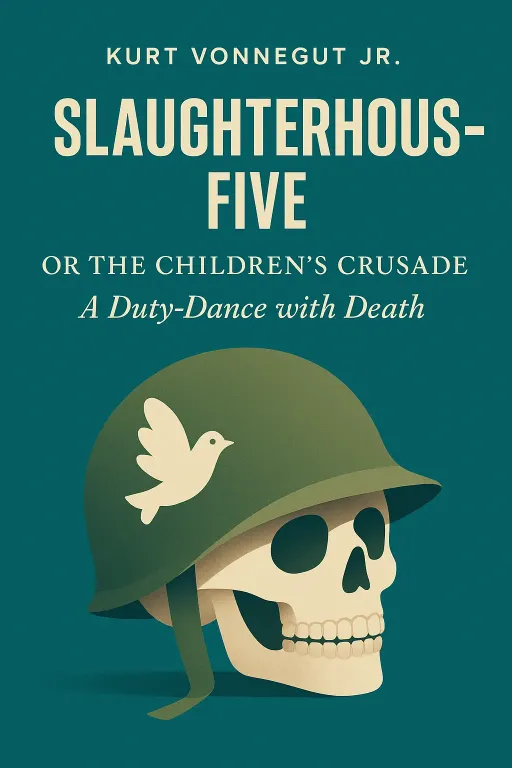
Slaughterhouse-Five, or The Children's Crusade
9 minA Duty-Dance with Death
Introduction
Narrator: What if you were forced to live your life out of order? To experience your own death, then be yanked back to a childhood swimming lesson, only to find yourself a prisoner of war moments later, with no control over where or when you’ll go next. This is the strange reality for Billy Pilgrim, a man who has become “unstuck in time.” He drifts through the moments of his life—the horrors of battle, the banality of his post-war career, his marriage, and even his own abduction by aliens—not as a linear progression, but as a series of disconnected, ever-present scenes. This fragmented existence, a "telegraphic schizophrenic" journey, is the core of Kurt Vonnegut's masterpiece, Slaughterhouse-Five. The novel uses this disorienting premise not just as a science-fiction gimmick, but as a profound tool to explore the deep, lingering trauma of war and the desperate human search for meaning in a world that often seems to have none.
Trauma Shatters Time
Key Insight 1
Narrator: The central premise of Slaughterhouse-Five is that its protagonist, Billy Pilgrim, experiences his life non-linearly. He is a mild-mannered optometrist who survived the horrific firebombing of Dresden as an American prisoner of war, and this trauma has fractured his perception of reality. He doesn't remember the war; he relives it, unpredictably. One moment he is examining a patient in his office in 1967, and the next he is a terrified, ill-equipped soldier stumbling behind enemy lines in 1944.
This time-travel is not an adventure but a symptom of his deep psychological wounds. The narrative jumps between mundane and horrific events, blurring the lines between them. For instance, Billy is at his daughter's wedding, a moment of celebration, and suddenly finds himself back in a cramped, stinking boxcar crossing Germany, where a fellow soldier, Roland Weary, is dying of gangrene. Another time, while visiting his aging mother in a nursing home, he is transported back to the war, where he and other prisoners are forced to shower in a delousing station, stripped of their clothes and dignity. These jarring transitions illustrate how the past is never truly past for a trauma survivor; it is a constant, intrusive presence that shapes and distorts the present.
War is an Absurd and Senseless Massacre
Key Insight 2
Narrator: Vonnegut relentlessly exposes the sheer absurdity of war. He strips away any notion of glory or heroism, replacing it with chaos, incompetence, and dark irony. This is powerfully illustrated through the story of Edgar Derby, a decent, middle-aged high school teacher who survives the worst of the fighting and the Dresden firebombing. Yet, in the aftermath, amidst a city of 135,000 corpses, Derby is arrested, put on trial, and executed by a firing squad for the crime of stealing a teapot from the ruins. His death is not heroic or meaningful; it is a bureaucratic, pointless act in a landscape of incomprehensible destruction.
This theme is reinforced by the author's direct commentary. He promises his friend's wife, Mary O'Hare, that he won't glorify the conflict, acknowledging that the soldiers were not men, but "babies." He concludes that after a massacre, there is nothing intelligent to say, only the sound of birds asking, "Poo-tee-weet?" This simple, nonsensical question becomes a recurring motif, representing the ultimate emptiness and lack of meaning that follows such profound violence. The novel argues that war is not a grand, purposeful endeavor but a senseless, chaotic force, much like a glacier—unstoppable and indifferent to the lives it crushes.
The Tralfamadorian Escape from Free Will
Key Insight 3
Narrator: To cope with the senselessness of his experiences, Billy Pilgrim finds solace in the philosophy of the Tralfamadorians, aliens who abduct him and keep him in a zoo on their planet. The Tralfamadorians can see all of time simultaneously, from beginning to end. For them, every moment has always existed and always will exist. They see individuals not as agents of free will, but as "bugs in amber," trapped in the structure of their unchangeable moments.
This deterministic worldview provides Billy with a powerful coping mechanism. The Tralfamadorians teach him that when a person dies, they only appear to die. They are still very much alive in the past. Therefore, it is foolish to mourn. Their response to any mention of death is a simple, calm phrase: "So it goes." Billy adopts this philosophy wholeheartedly. It allows him to accept the death of his wife, the horrors of Dresden, and even his own foretold assassination without despair. While this perspective offers comfort, it also presents a troubling question: is this acceptance a form of enlightenment, or is it a dangerous resignation that absolves humanity of responsibility for its own destructive actions?
The Children's Crusade and the Betrayal of Innocence
Key Insight 4
Narrator: The novel's subtitle, "The Children's Crusade," is a direct and powerful metaphor. Vonnegut explicitly references the historical Children's Crusade of 1213, where thousands of children were duped into a tragic march, only to be sold into slavery or drown at sea. He connects this to the soldiers of World War II, whom he sees as equally innocent and betrayed. An English colonel, upon seeing the fresh-faced, terrified American prisoners, is shocked and says to himself, "My God, my God—It's the Children's Crusade."
This idea is born from a promise Vonnegut made to Mary O'Hare, the wife of his war buddy. She was furious at the idea of him writing a book that might glorify war, making it seem like a grand adventure for men. She reminded him forcefully, "You were just babies then!" This encounter forces Vonnegut to confront the truth that wars are fought by the young, who are sent to kill and be killed by institutions and leaders far removed from the front lines. The novel is, therefore, a fulfillment of his promise: an anti-war book that refuses to glamorize violence and instead mourns the loss of innocence.
The Unspeakable Reality of Dresden
Key Insight 5
Narrator: At the heart of the book lies the event that Vonnegut himself survived: the Allied firebombing of Dresden in February 1945. Dresden was known as "The Florence of the Elbe," a city of art and culture with no significant military value. It was declared an "open city," supposedly safe from attack. The American prisoners, including Billy, were housed in an underground meat locker, Slaughterhouse-Five.
While the city above was incinerated in a firestorm that killed more people than the atomic bomb at Hiroshima, Billy and his fellow prisoners were safe. When they emerged, they found a landscape of total annihilation. The world was "like the moon, nothing but minerals." Their first task was to become "corpse miners," digging through the ruins to retrieve the dead. The experience is so horrific that it defies language, leaving only the silence after the massacre, punctuated by the chirping of a bird. This personal, historical trauma is the silent, screaming center of the novel, the source of Billy's fractured mind and the ultimate proof of the book's central argument about the senseless, indiscriminate horror of war.
Conclusion
Narrator: The single most important takeaway from Slaughterhouse-Five is that war is an engine of absurd, meaningless destruction that shatters not only cities but also the human mind, leaving behind wounds so deep that they break the very fabric of time and memory. Kurt Vonnegut presents this not as a political argument, but as a deeply personal and human truth.
The book leaves us with the challenging philosophy of the Tralfamadorians and their mantra, "So it goes." Is this fatalistic acceptance the only sane response to a world of inescapable suffering? Or is it a dangerous passivity that allows history to repeat its most brutal mistakes? Vonnegut offers no easy answers, forcing us to confront the question ourselves: in the face of tragedy, do we accept the moment as it is structured, or do we fight, however futilely, to change it?









